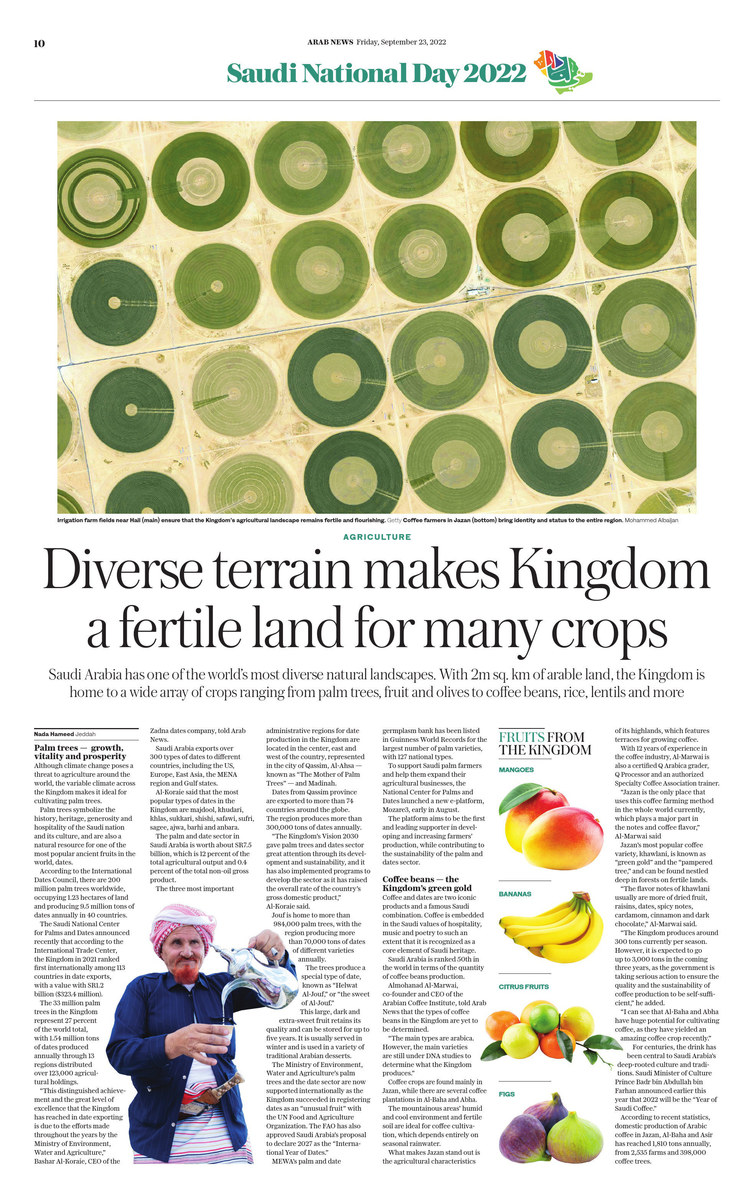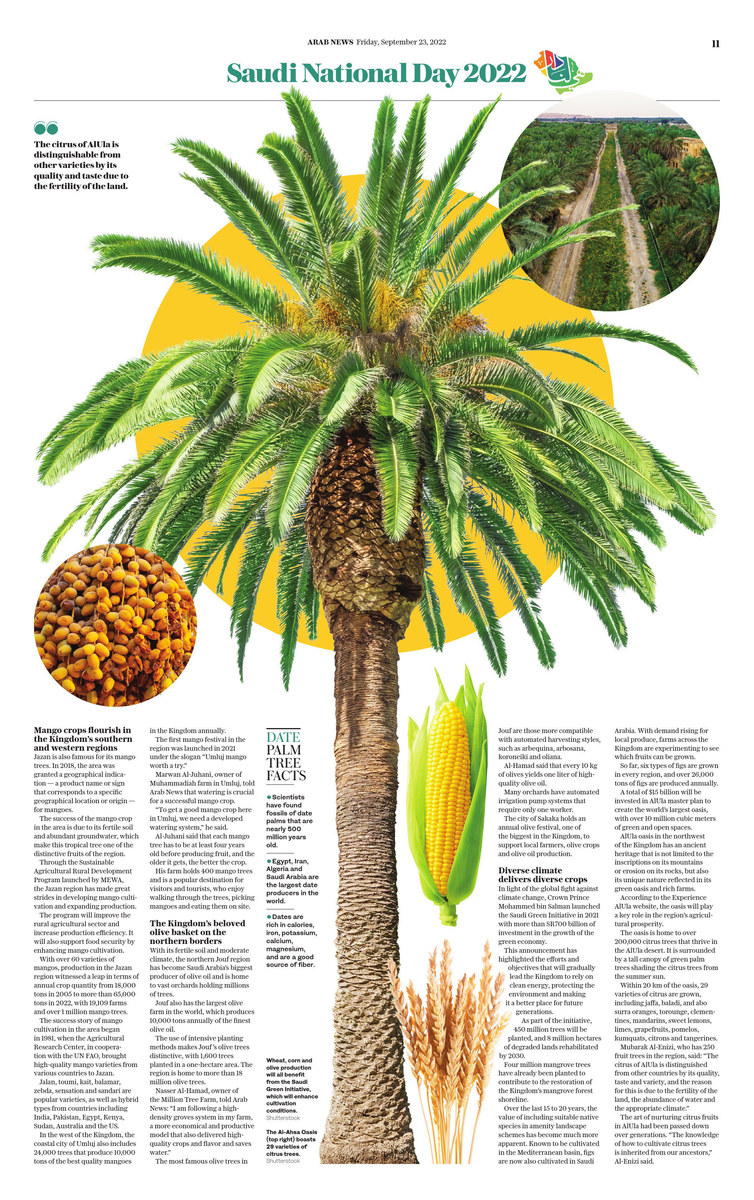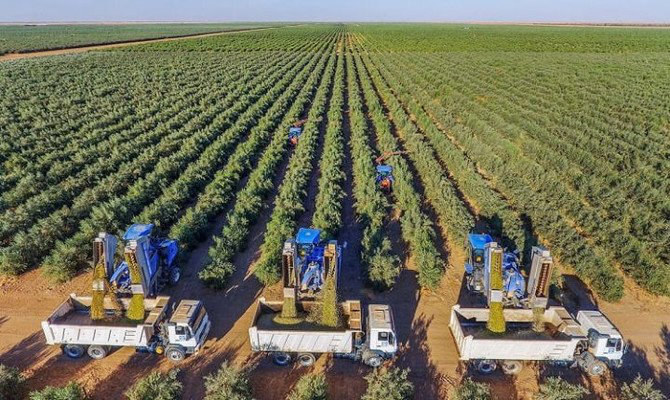JEDDAH: Saudi Arabia has one of the world’s most diverse natural landscapes. With 2 million square kilometers of land, the Kingdom is home to crops ranging from palm trees, fruit and olives to coffee beans, rice, lentils and more.
Palm trees — growth, vitality and prosperity
Although climate change poses a threat to agriculture around the world, the variable climate in different regions of the Kingdom makes it ideal for cultivating palm trees.
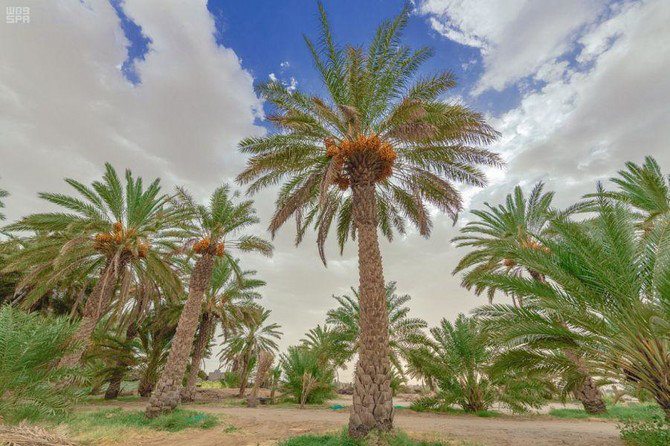
Blessed with abundant rainfall, Bisha province in the Kingdom's southwest boasts of fully organic palm trees and free of pesticides. (SPA file photo)
Palm trees symbolize the history, heritage, generosity and hospitality of the Saudi nation and its culture, and are also a natural resource for one of the most popular ancient fruits in the world, dates.
According to the International Dates Council, there are 200 million palm trees worldwide, occupying 1.23 hectares of land and producing 9.5 million tons of dates annually in 40 countries.
The Saudi National Center for Palms and Dates announced recently that according to the International Trade Center, the Kingdom in 2021 ranked first internationally among 113 countries in date exports, with a value with SR1.2 billion ($323.4 million).
The 33 million palm trees in the Kingdom represent 27 percent of the world total, with 1.54 million tons of dates produced annually through 13 regions distributed over 123,000 agricultural holdings.
“This distinguished achievement and the great level of excellence that the Kingdom has reached in date exporting is due to the efforts made throughout the years by the Ministry of Environment, Water and Agriculture,” Bashar Al-Koraie, CEO of the Zadna dates company, told Arab News.
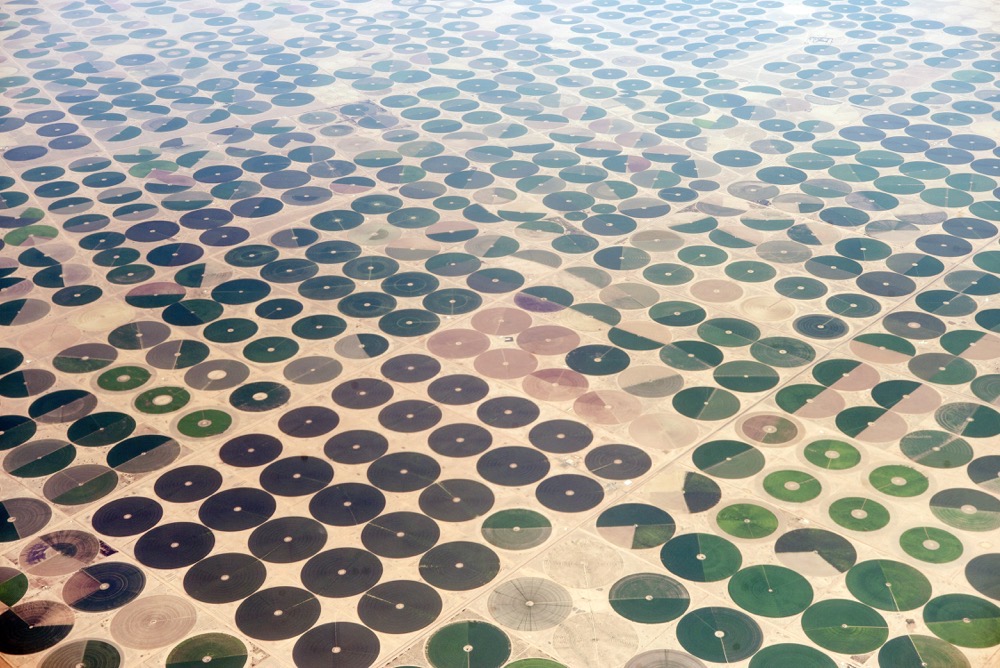
A general view taken from an airplane on September 11, 2014 shows cultured farms in northern Saudi Arabia. (AFP file)
The ministry also assisted in promoting the Saudi dates brand by improving the quality of production on farms, following best agricultural practices, and adopting quality standards for exportable dates in factories and packing stations.
Saudi Arabia exports over 300 types of dates to different countries, including the US, Europe, East Asia, the MENA region and Gulf states.
Al-Koraie said that the most popular types of dates in the Kingdom are majdool, khudari, khlas, sukkari, shishi, safawi, sufri, sagee, ajwa, barhi and anbara.
The palm and date sector in Saudi Arabia is worth about SR7.5 billion, which is 12 percent of the total agricultural output and 0.4 percent of the total non-oil gross product.
The three most important administrative regions for date production in the Kingdom are located in the center, east and west of the country, represented in the city of Qassim, Al-Ahsa — known as “The Mother of Palm Trees” — and Madinah.
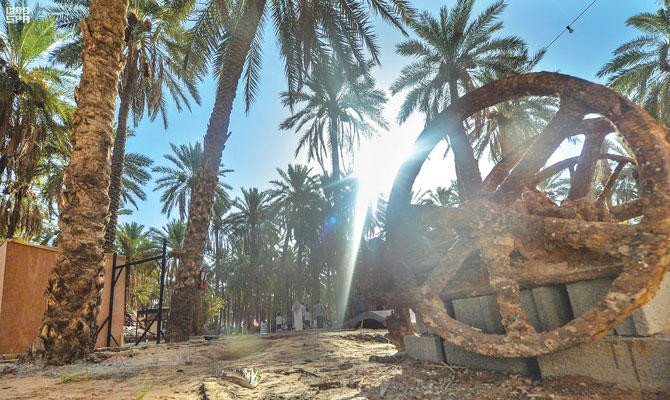
Qassim region in central Saudi Arabia is one of the largest producers of dates. (SPA)
Dates from Qassim province are exported to more than 74 countries around the globe. The region produces more than 300,000 tons of dates annually.
“The Kingdom’s Vision 2030 gave palm trees and dates sector great attention through its development and sustainability, and it has also implemented programs to develop the sector as it has raised the overall rate of the country’s gross domestic product,” Al-Koraie said.
Jouf is home to more than 984,000 palm trees, with the region producing more than 70,000 tons of dates of different varieties annually.
The trees produce a special type of date, known as “Helwat Al-Jouf,” or “the sweet of Al-Jouf.”
This large, dark and extra-sweet fruit retains its quality and can be stored for up to five years. It is usually served in winter and is used in a variety of traditional Arabian desserts.
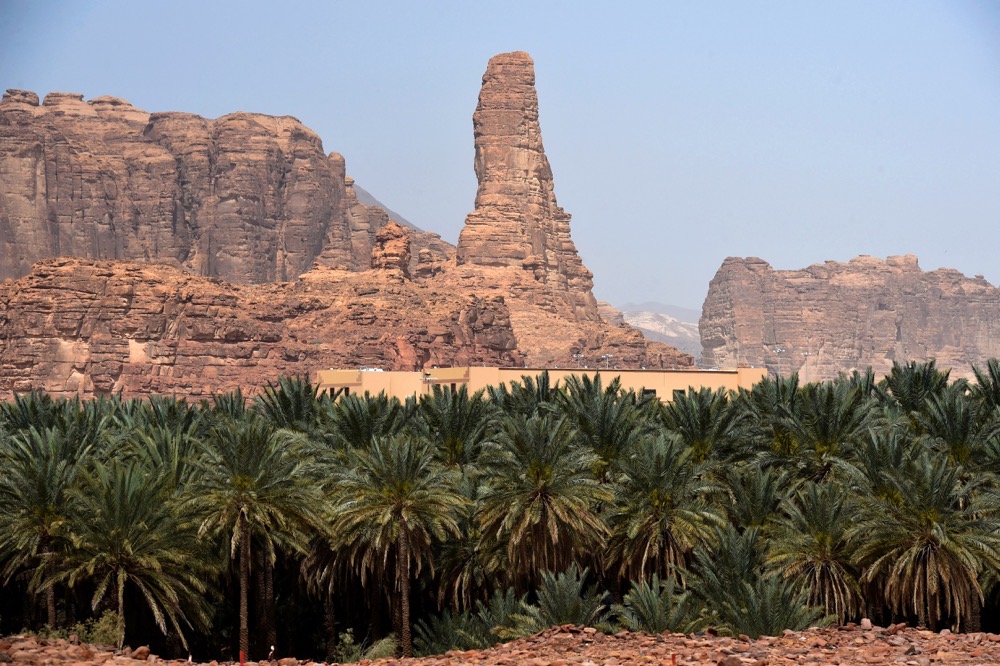
Palm dates in the oasis of Madain Saleh in AlUla. (Supplied)
The Ministry of Environment, Water and Agriculture’s palm trees and the date sector are now supported internationally as the Kingdom succeeded in registering dates as an “unusual fruit” with the UN Food and Agriculture Organization. The FAO has also approved Saudi Arabia’s proposal to declare 2027 as the “International Year of Dates.”
MEWA’s palm and date germplasm bank has been listed in Guinness World Records for the largest number of palm varieties, with 127 national types.
To support Saudi palm farmers and help them expand their agricultural businesses, the National Center for Palms and Dates launched a new e-platform, Mozare3, early in August.
The platform aims to be the first and leading supporter in developing and increasing farmers’ production, while contributing to the sustainability of the palm and dates sector.
Coffee beans — the Kingdom’s green gold
Coffee and dates are two iconic products and a famous Saudi combination. Coffee is embedded in the Saudi values of hospitality, music and poetry to such an extent that it is recognized as a core element of Saudi folk heritage.
Saudi Arabia is ranked 50th in the world in terms of the quantity of coffee beans production.
Almohanad Al-Marwai, co-founder and CEO of the Arabian Coffee Institute, told Arab News that the types of coffee beans in the Kingdom are yet to be determined.
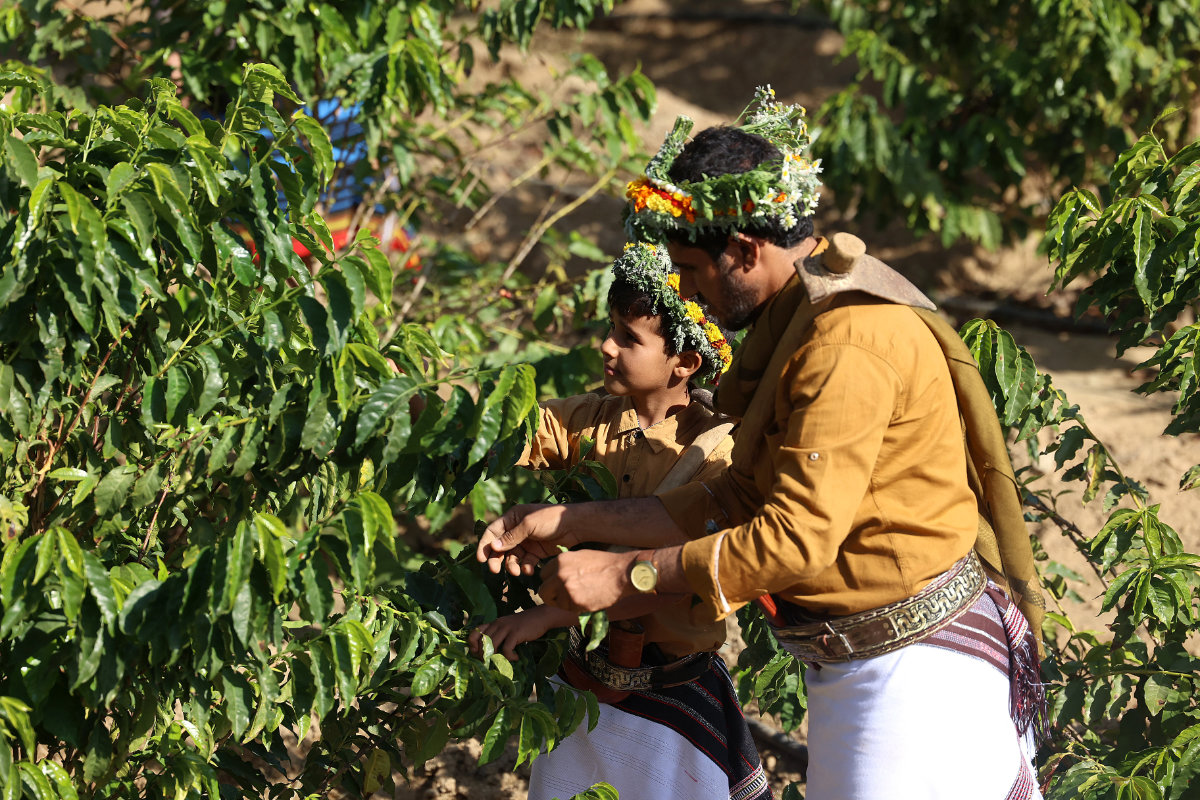
A Saudi farmer and his son harvest Khawlani coffee beans at a coffee farm in the southwestern region of Jazan on January 26, 2022. (AFP file)
“The main types are arabica. However, the main varieties are still under DNA studies to determine what the Kingdom produces.”
Coffee crops are found mainly in Jazan, while there are several coffee plantations in Al-Baha and Abha.
The mountainous areas’ humid and cool environment and fertile soil are ideal for coffee cultivation, which depends entirely on seasonal rainwater.
What makes Jazan stand out is the agricultural characteristics of its highlands, which feature terraces for growing coffee.
With 12 years of experience in the coffee industry, Al-Marwai is also a certified Q Arabica grader, Q Processor and an authorized Specialty Coffee Association trainer.
“
Jazan is the only place that uses this coffee farming method in the whole world currently, which plays a major part in the notes and coffee flavor,” Al-Marwai said Jazan’s most popular coffee variety, khawlani, is known as “green gold” and the “pampered tree,” and can be found nestled deep in forests on fertile lands.
“The flavor notes of khawlani usually are more of dried fruit, raisins, dates, spicy notes, cardamom, cinnamon and dark chocolate,” Al-Marwai said.
“The Kingdom produces around 300 tons currently per season. However, it is expected to go up to 3,000 tons in the coming three years, as the government is taking serious action to ensure the quality and the sustainability of coffee production to be self-sufficient,” he added.
“I can see that Al-Baha and Abha have huge potential for cultivating coffee, as they have yielded an amazing coffee crop recently.”
For centuries, the drink has been central to Saudi Arabia’s deep-rooted culture and traditions. Saudi Minister of Culture Prince Badr bin Abdullah bin Farhan announced earlier this year that 2022 will be the “Year of Saudi Coffee.”
According to recent statistics, domestic production of Arabic coffee in Jazan, Al-Baha and Asir has reached 1,810 tons annually, from 2,535 farms and 398,000 coffee trees.
Mango crops flourish in the Kingdom’s southern and western regions
Jazan is also famous for its mango trees. In 2018, the area was granted a geographical indication — a product name or sign that corresponds to a specific geographical location or origin — for mangoes.
The success of the mango crop in the area is due to its fertile soil and abundant groundwater, which make this tropical tree one of the distinctive fruits of the region.
Through the Sustainable Agricultural Rural Development Program launched by MEWA, the Jazan region has made great strides in developing mango cultivation and expanding production.
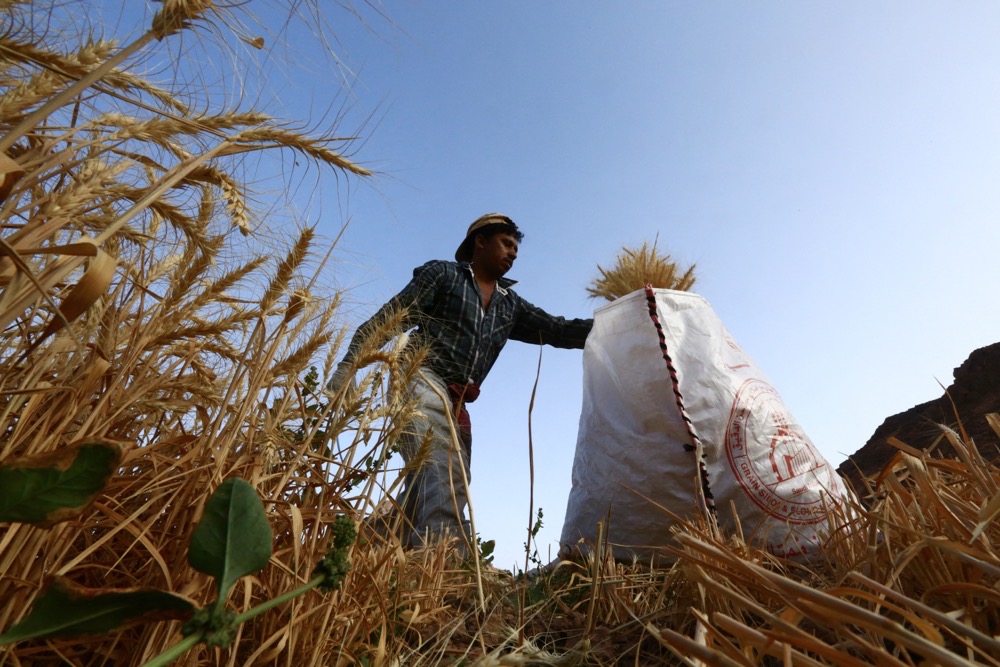
The program aims to improve the rural agricultural sector and raise the standard of living of rural families. It also aims to increase production efficiency, improve lifestyle and achieve food security, including supporting mango cultivation.
With over 60 varieties of mangoes, production in the Jazan region witnessed a leap in terms of annual crop quantity from 18,000 tons in 2005 to more than 65,000 tons in 2022, with 19,109 farms and over 1 million mango trees.
The success story of mango cultivation in the area began in 1981, when the Agricultural Research Center, in cooperation with the UN FAO, brought high-quality mango varieties from various countries to Jazan.
Jalan, toumi, kait, balamar, zebda, sensation and sandari are popular varieties, as well as hybrid types from countries including India, Pakistan, Egypt, Kenya, Sudan, Australia and the US.
In the west of the Kingdom, the coastal city of Umluj also includes 24,000 trees that produce 10,000 tons of the best quality mangoes in the Kingdom annually.
The first mango festival in the region was launched in 2021 under the slogan “Umluj mango worth a try.”
Marwan Al-Juhani, owner of Muhammadiah farm in Umluj, told Arab News that watering is crucial for a successful mango crop.
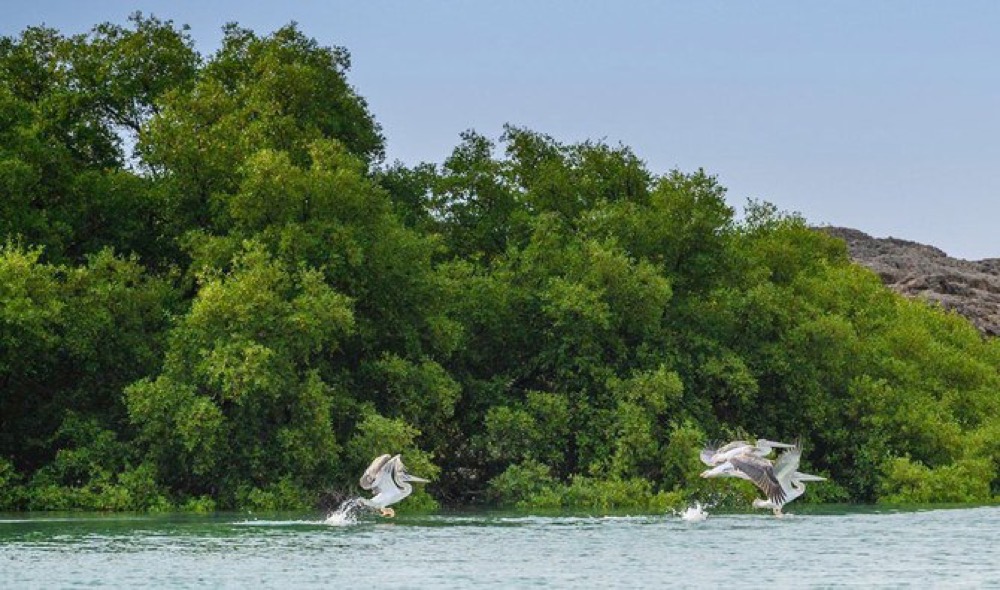
“To get a good mango crop here in Umluj, we need a developed watering system,” he said.
Al-Juhani said that each mango tree has to be at least four years old before producing fruit, and the older it gets, the better the crop.
His farm holds 400 mango trees and is a popular destination for visitors and tourists, who enjoy walking through the trees, picking mangoes and eating them on site.
The Kingdom’s beloved olive basket on the northern borders
With its fertile soil and moderate climate, the northern Jouf region has become Saudi Arabia’s biggest producer of olive oil and is home to vast orchards holding millions of trees.
Jouf also has the largest olive farm in the world, which produces 10,000 tons annually of the finest olive oil.
The use of intensive planting methods makes Jouf’s olive trees distinctive, with 1,600 trees planted in a one-hectare area. The region is home to more than 18 million olive trees.
Nasser Al-Hamad, owner of the Million Tree Farm, told Arab News: “I am following a high-density groves system in my farm, a more economical and productive model that also delivered high-quality crops and flavor and saves water.”
The most famous olive trees in Jouf are those more compatible with automated harvesting styles, such as arbequina, arbosana, koroneiki and oliana.
Al-Hamad said that every 10 kg of olives yields one liter of high-quality olive oil.
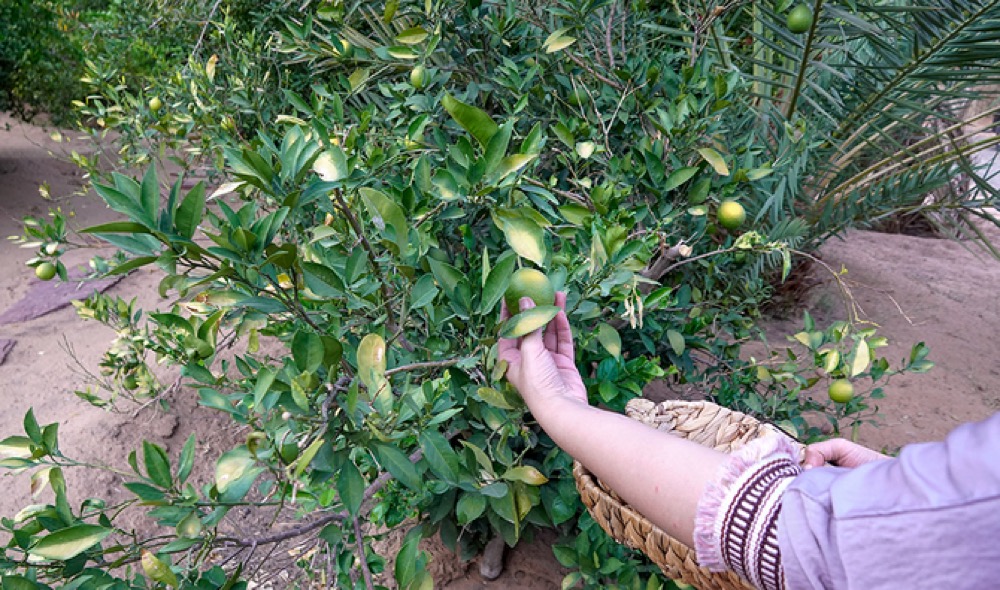
Many orchards have automated irrigation pump systems that require only one worker.
The city of Sakaka holds an annual olive festival, one of the biggest in the Kingdom, to support local farmers, olive crops and olive oil production.
Diverse climate equals diverse crops
In light of the global fight against climate change, Crown Prince Mohammed bin Salman launched the Saudi Green Initiative in 2021 with more than SR700 billion of investment in the growth of the green economy.
This announcement has highlighted the efforts and objectives that will gradually lead the Kingdom to rely on clean energy, protecting the environment and making it a better place for future generations.
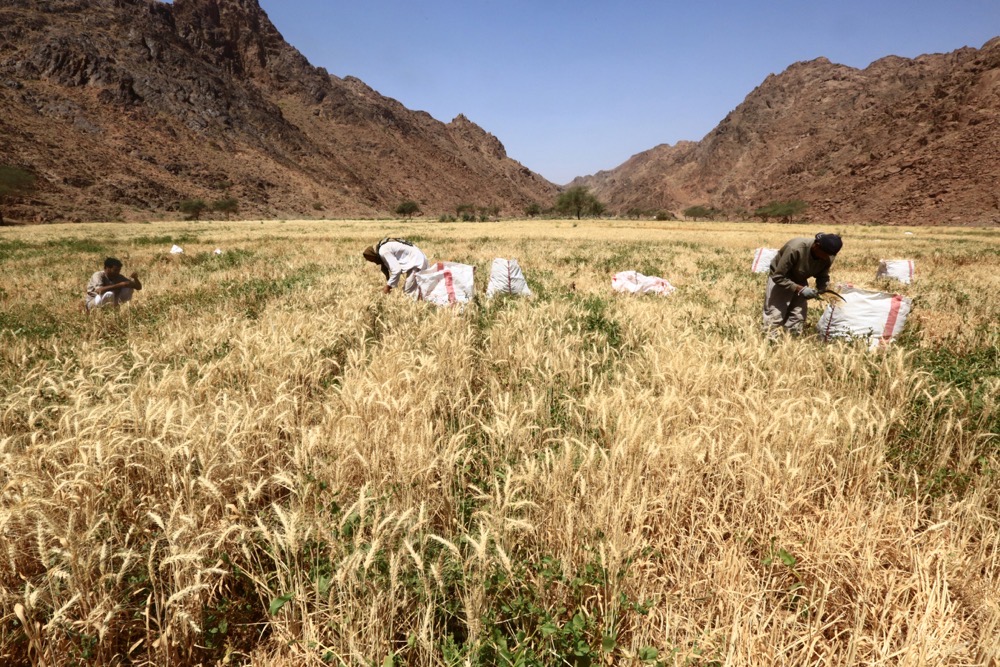
Workers harvest wheat in a field in the northwestern region of Tabuk on April 7, 2016. (AFP file)
As part of the initiative, 450 million trees will be planted, and 8 million hectares of degraded lands rehabilitated by 2030.
Four million mangrove trees have already been planted to contribute to the restoration of the Kingdom’s mangrove forest shoreline.
Over the last 15 to 20 years, the value of including suitable native species in amenity landscape schemes has become much more apparent. Known to be cultivated in the Mediterranean basin, figs are now also cultivated in Saudi Arabia. With demand rising for local produce, farms across the Kingdom are experimenting to see which fruits can be grown.
So far, six types of figs are grown in every region, and over 26,000 tons of figs are produced annually.
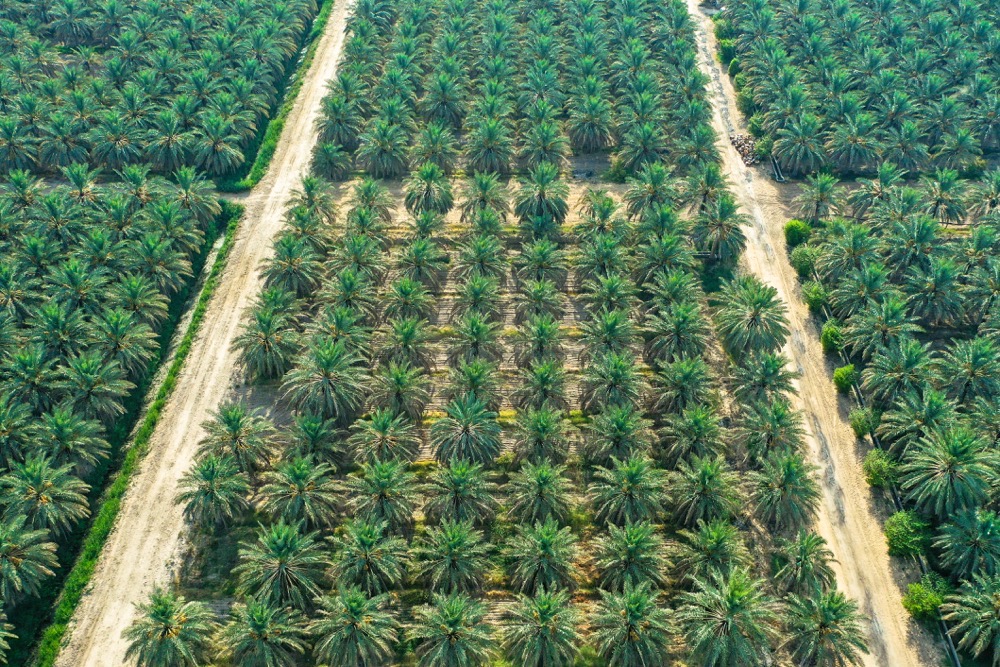
A total of $15 billion will be invested in AlUla master plan to create the world’s largest oasis, with over 10 million cubic meters of green and open spaces.
AlUla oasis in the northwest of the Kingdom has an ancient heritage that is not limited to the inscriptions on its mountains or erosion on its rocks, but rather embraces a unique nature reflected in its green oasis and rich farms.
According to the Experience AlUla website, the oasis will play a key role in the region’s agricultural prosperity.
The oasis is home to over 200,000 citrus trees that thrive in the AlUla desert. It is surrounded by a tall canopy of green palm trees shading the citrus trees from the summer sun.
Within 20 kilometers of the oasis, 29 varieties of citrus are grown, including jaffa, baladi, and abo surra oranges, torounge, clementines, mandarins, sweet lemons, limes, grapefruits, pomelos, kumquats, citrons and tangerines.
Mubarak Al-Enizi, who has 250 fruit trees in the region, said: “The citrus of AlUla is distinguished from other countries by its quality, taste and variety, and the reason for this is due to the fertility of the land, the abundance of water and the appropriate climate.”
The art of nurturing citrus fruits in AlUla had been passed down over generations. “The knowledge of how to cultivate citrus trees is inherited from our ancestors,” Al-Enizi said.
